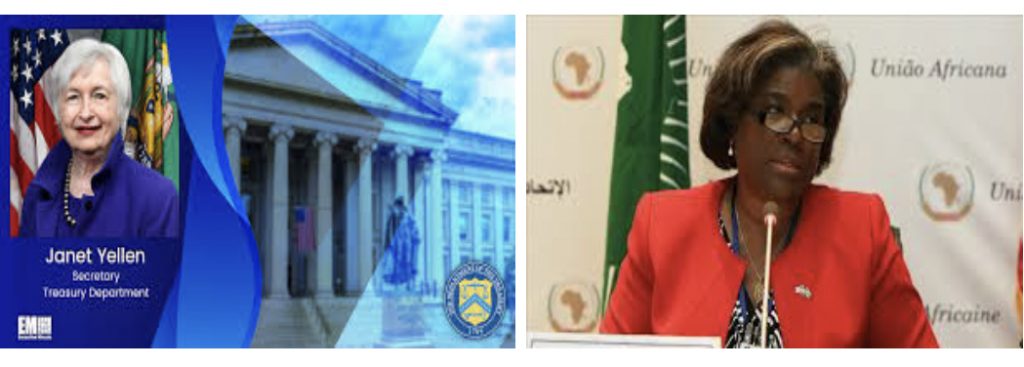Published: February 01,2023
By Gerald Mbanda

US Treasury Secretary Janet Yellen and U.S. Ambassador to the United Nations Linda Thomas-Greenfield
In mid-January, US Treasury Secretary Janet Yellenstarted a 10 day African tour that took her to Senegal, Zambia and South Africa. While in Senegal, Yallenvisited Gorre Island known for its role in the 15th- to 19th-century Atlantic slave trade from which the US benefited manpower that worked under forced labor in Cotton, rice, corn, sugarcane and tobacco plantations. I hope while at Gorre Island she remembered that it is sweat and blood of the African slaves that grew the US economy.
At Goree Island, Yellen said that, “ultimately, GoreeIsland reminds us that the histories of Africa and America are intimately connected. We know that the tragedy did not stop with the generation of humans taken from here.” It is absurd and shameful that Yellenreferred to the US- African relations during slave trade as “intimately connected,” as if slave trade was something to boast about. Her statement of the“unspeakable cruelty” of the trans-Atlantic slave tradewas considered more as shedding crocodile tears.
In Senegal, Yellen repeated the US position of wanting to drag African countries in taking sides on the current Russian-Ukraine crisis by suggesting that Russia is responsible for the war and therefore, the root cause of the global increase in prices of food, fuel and fertilizers. Her suggestion was that the US will be the savior to work with Senegal in building a more resilient global economy in the face of overlapping shocks.
Yellen said that 17 of the world’s top 20 climate-vulnerable countries are African. She announced U.S. plans to expand partnerships with Africa on conservation, climate adaptation and access to clean energy, promising that President Joe Biden’s intendedto provide over $1 billion to support African-led climate resilience efforts. The choice of Senegal as the first country of her visit was not accidental. Senegal is the current Chair of the Forum for China and Africa Cooperation (FOCAC), and therefore, the core Centre of countering China Influence in Africa.
Over the past two decades, FOCAC has been an important platform for collective dialogue between China and Africa and an effective mechanism for pragmatic cooperation. FOCAC now comprises of 53African countries that have diplomatic relations with China, and the African Union Commission. The 2021 Senegal conference adopted the Dakar Declaration, the Dakar Plan of Action (2022-2024), the Declaration on China-Africa Cooperation on Climate Change, and the 2035 Vision for China-Africa Cooperation. These are important cooperation frameworks that have already delivered transformational development in Africa.
Although Yellen said that, “the United States is all in on Africa, and all in with Africa,” adding that, “And our engagement is not transactional. It’s not for show. And it’s not for the short term,” political analysts believe that typical of US policy, only the opposite is true. The US woke up late when China is the darling of Africa and the intention is to cajole African countries to turn to US. History shows that the west has only been interested in Africa for exploitation and not to support the continent for development. The decade’s long Aid industry has left the Africa continent poorer, with no concrete development, while most of the Aid money has been siphoned back to the west.
After Treasury Secretary Janet Yellen’s Africa visit, the U.S. Ambassador to the United Nations Linda Thomas-Greenfield also came in, for a two day visit to Mozambique and Kenya. “I’m getting ready to get my hands dirty with you today to help this beach to survive”, she told volunteers at Costa do Sol beach in the capital Maputo. She emphasized partnership in environment and climate change. Janet Yellen and Thomas-Greenfield’s trips came following last month’s U.S.-Africa Leaders Summit, where Biden pledged $55 billion in economic, health and security aid to the continent over the next three years.
Ambassador Linda Thomas-Greenfield was chosen by the US administration to visit Africa because of her well known anti-China rhetoric. In January 2021, while appearing before the Senate Foreign Relations Committee she stated that China’s success depended on US continued withdrawal, which she promised, “will not happen on my watch.” She further stated that, “We know China is working across the UN system to drive an authoritarian agenda that stands in opposition to the founding values of the institution — American values.” She also said that she regretted giving a speech at China’s Confucius Institute in 2019. “I truly regret having accepted that invitation and having had my name associated with the Confucius Institutes.” Her hostile attitude towards China, cannot in any way influence African countries to listen to her. African countries know well who their real allies are and do not need to be influenced.
Diplomatic analysts believe that the $55billion pledged during the U.S-Africa Summit to support the continentin three years was simply a photo show compared to more than $100billion that the US has already pumped in supporting Ukraine war machinery. “This shows where the US heart lies. It is not in Africa,” an African diplomat told this website.
 Africa -China Review Africa -China Cooperation and Transformation
Africa -China Review Africa -China Cooperation and Transformation
